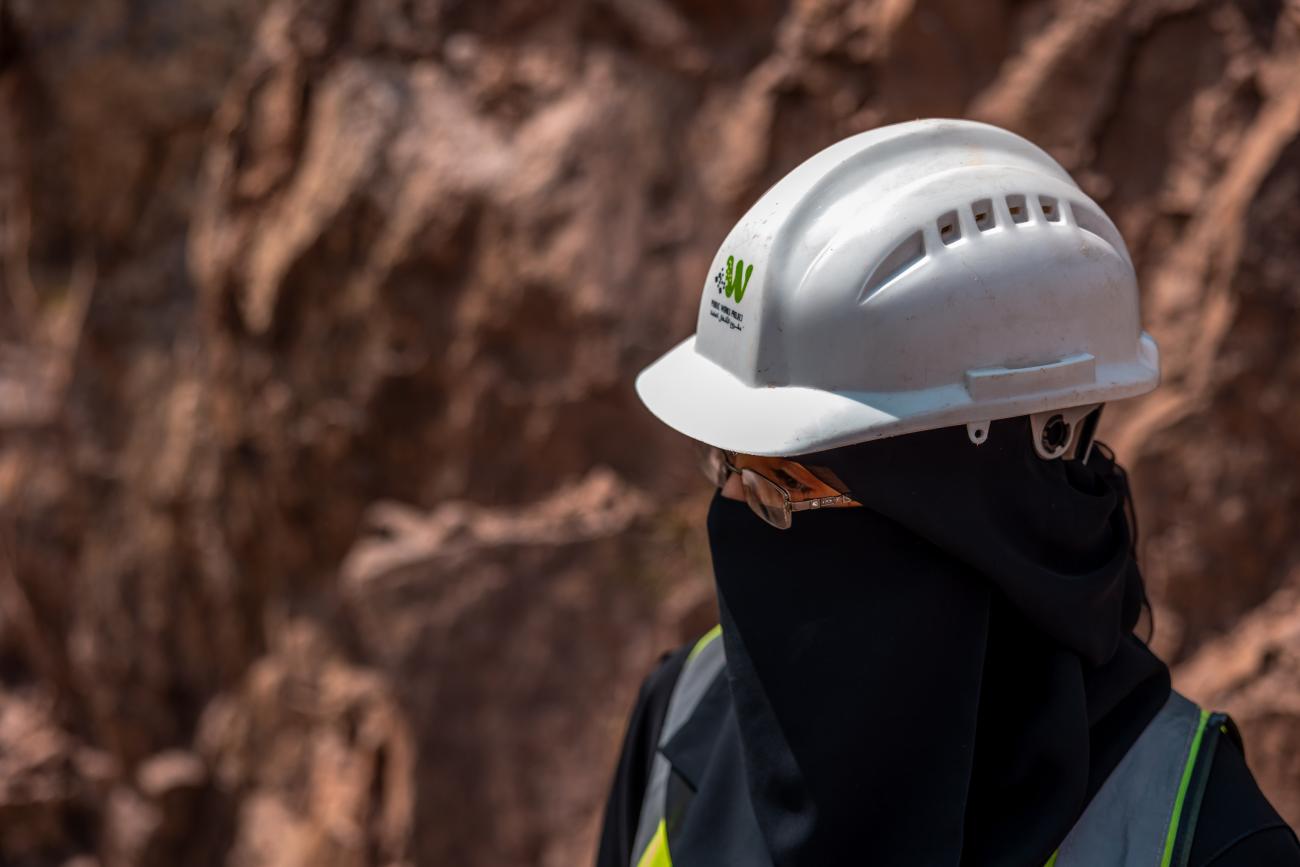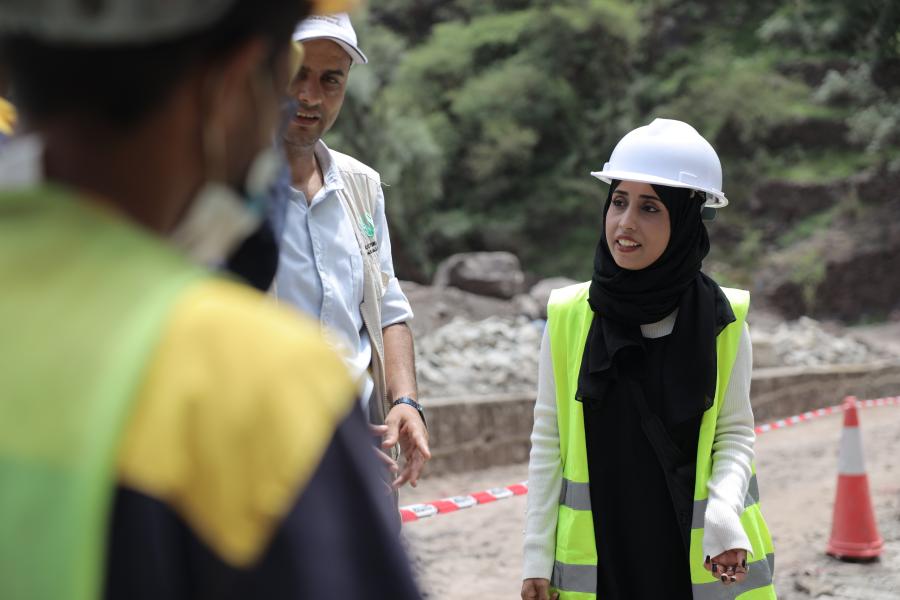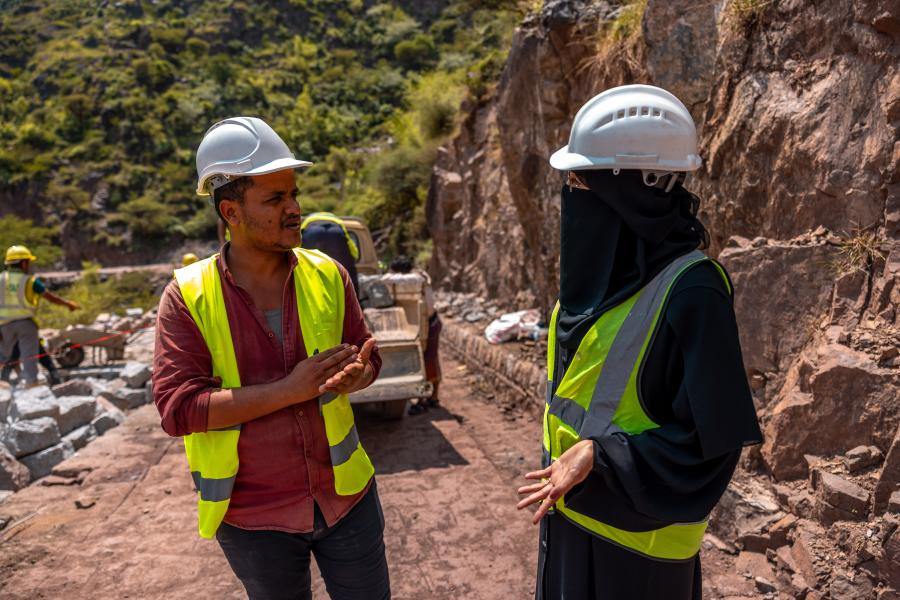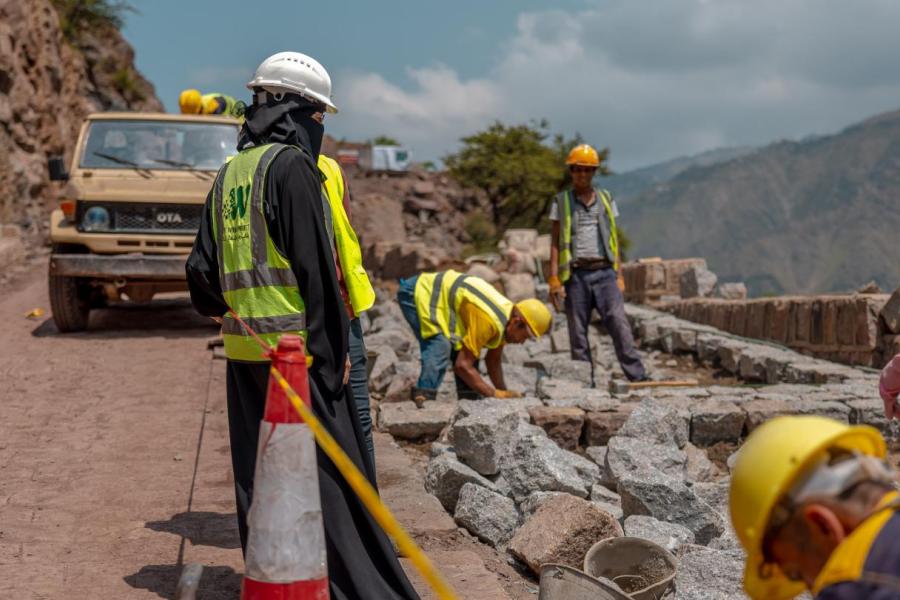UNDP Yemen: Meet Nahla and Sally: Yemeni women building careers in construction

--
In the rugged mountains of southern Taiz Governorate, Yemen, Nahla oversees workers as they pave roads with stones, while close by, Sally supervises a similar road paving project. Both have recently entered the public works sector, proving themselves as skilled contractors and paving the way for more women to enter the field of construction.
In a short time, Nahla and Sally proved themselves capable and completed important road paving projects in Al-Misrakh District of Taiz Governorate as part of the World Bank-supported Emergency Social Protection Enhancement and COVID-19 Response Project (ESPECRP) and the Food Security Response and Resilience Project (FSRRP), implemented by the United Nations Development Programme (UNDP) with local partner Public Works Project (PWP).
Reflecting on her journey, Nahla says, “I decided to work in the construction sector because I’m an engineer, and I’ve supervised various projects for the Water and Sanitation Corporation in Ibb, working closely with contractors. This exposure sparked my interest in this field.” She adds, “I received training from the Public Works Project (PWP) on how to compete in tenders, and this support encouraged me to venture into construction.”
Similarly, Sally shares, “My journey began as an architect working on office-based consulting projects. However, this road paving project allowed me to enter fieldwork, where I learned essential skills like material procurement and supplier management. It’s been a transformative experience.”

Nahla and Sally each separately won their bids to pave different roads in the same district of Al-Misrakh, Taiz Governorate, as a part of the community contracting approach adopted by both ESPECRP and FSRRP projects.
“Winning this bid was a major leap forward,” Nahla shares. “It opened a window of hope, allowing me to pursue my long-held dream of working in construction—a field I’ve been passionate about for years.”
Investing in human capital
Nahla’s success and Sally’s determination are testaments to the power of building skills through vocational training. Through programmes like community contracting, women are gaining the skills they need to expand into new industries, transforming their lives and communities. Community contracting works by hiring and paying local community members to improve their own infrastructure and using local resources as much as possible.
Community contracting is a firm investment in human capital, bringing sustainable income and skills to local communities. Nahla emphasizes that, “Community contracting is a vital step in empowering women in the construction sector, offering them opportunities to learn skills and acquire knowledge that are in demand in the local job market.”
Sally echoes Nahla’s statement, adding, “these projects teach me new skills, and prepare me for future opportunities in diverse fields”.

After opening her own engineering office, Nahla won the bid to pave a road in Taiz, attributing her success to several factors, including the training she received.
“I entered this project with the ambition and determination to become a leading contractor. My goal is to achieve accomplishments that will help me continue in this sector, whether it is road paving or other construction projects,” Nahla explains.
Making a difference
Nahla is committed to improving her skills, drawing on valuable experience from supervising small-scale projects and conducting studies. “As an engineer with project supervision experience, I didn’t face major challenges in my role as a contractor,” she says. However, she notes, “There were some initial difficulties, but I overcame them with perseverance and willpower.”
“The road paving work was carried out according to the pre-prepared plan,” Nahla says. “The length of the paved road is over 4,350 meters, benefiting villages in the Al-Aqrud area and Taiz residents more broadly.” She shares proudly that “The project was completed within the 45-day deadline, providing jobs for 23 workers, including eight women who worked on spraying and planting trees.”
Nahla also highlights the project’s positive impact: “We used high-quality materials to ensure the safety of nearly 90,000 residents who use the road. Most importantly, this experience helped to show that women are capable of working in the construction field.”

Leaving a footprint
Nahla is determined to make a lasting impact on the construction industry, focusing on proving her capabilities. “I plan to continue working in this field and invest in the necessary equipment to compete and win more bids,” she asserts.
Sally also views her current project as a stepping stone. “These experiences build a solid foundation for my career,” she explains, reflecting on the long-term benefits of engaging in community development projects.

Nahla calls for greater support for female contractors, stating that such assistance is crucial for women to overcome challenges and thrive in the industry. “Support is essential for women to succeed as contractors,” she concludes.
Due to initiatives like community contracting, women like Nahla and Sally are increasingly being included in local development activities, gaining the skills needed to secure their livelihoods and contribute to their communities.
***
With funding and support from the World Bank's International Development Association (IDA), UNDP Yemen implements ESPECRP and FSRRP projects to enhance food security and community resilience in Yemen in partnership with the Social Fund for Development (SFD), the Public Works Project (PWP), and the Small and Micro Enterprise Promotion Service (SMEPS)




